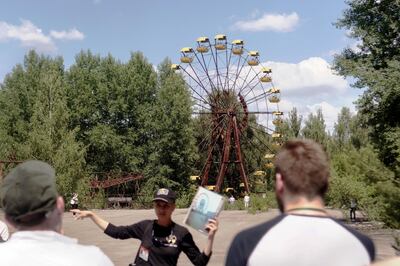A grim story of nuclear disaster makes for a surprisingly hit TV series.
Like many, I've been watching the HBO-Sky collaboration Chernobyl, which combines visceral moments of terror with philosophical observation of the reaction of people and their political systems to catastrophe. The drama has some powerful lessons – but not the obvious ones.
Screenwriter Craig Mazin has crafted a gripping story around the 1986 reactor meltdown in Ukraine, then part of the Soviet Union. There are some concessions to dramatic licence and storytelling, but no serious falsifications. If we now know that some of the worst-case scenarios outlined by the scientists grappling with the problem could not have happened, that was not obvious to them at the time.
Many will take away a renewed sense of the dangers of nuclear power and radiation from watching the series. A visit today to the disaster zone, with a crackling Geiger counter, is even more compelling. But Mazin's intent is to get at wider truths and, as he says, the "lesson of Chernobyl isn't that modern nuclear power is dangerous. The lesson is that lying, arrogance and suppression of criticism are dangerous".
The Russian president at the time, Mikhail Gorbachev, blamed the accident for the fall of the Union of Soviet Socialist Republics: partly because of the huge cost of clean-up while the Soviet economy was moribund, but more than that, the blow to Communist party prestige. In the TV show, acknowledging the accident required more “glasnost”, Mr Gorbachev's policy of greater openness, which spiralled into the dissolution of central command.
Of course, this is self-serving, avoiding responsibility for Mr Gorbachev's failure to restructure the system without breaking it. The ruin of the Soviet economy, beyond its intrinsic failings, was largely due to the slump in oil prices that also occurred in 1986, as former Russian prime minister and economist Yegor Gaidar brilliantly explained in his 2007 book Collapse of an Empire. The USSR, meant to be a technological leader, had instead degenerated under the flood of 1970s oil money into a petro-state little more robust than Venezuela.
Ironically, Mr Gorbachev had sought to move the country away from oil and gas dependence – towards nuclear power. The city of Pripyat, founded in 1970 to house workers at Chernobyl, is now an eerie ghost town but, at the time, with its fun fair, cinema and restaurants, it was the closest the late USSR came to a workers' utopia.
Like Alexander Solzhenitsyn's 1966 novel Cancer Ward, in Chernobyl the overt threat of radiation or disease becomes a metaphor for a rotten system. Nuclear scientist Valery Legasov (played by Jared Harris) observes to apparatchik-with-a-heart Boris Shcherbina (Stellan Skarsgård): "Every lie we tell incurs a debt to the truth. Sooner or later, the debt is paid."
Soviet totalitarianism, with its facade of invulnerability and culture of secrecy and deceit, was peculiarly vulnerable to this malaise.
But this weakness is not unique to the USSR. Today’s Russia, the largest international developer of reactors, is more open than its forebear but is still run by an ex-KGB man. China, now the world’s leading builder of nuclear power plants, is state capitalist in economics but Leninist in politics.
Even in democratic societies, South Korea’s nuclear industry was rocked in 2014 by a series of revelations about faulty parts, corruption and faking of safety certificates. Nuclear power is not the only, or even worst offender – its accidents are high profile in consequences, but very rare.
Boeing's 737 Max crashes in the past year, BP's Deepwater Horizon oil spill in 2010 and Union Carbide's Bhopal chemical leak in 1984, show recurring patterns of poor design, excessive cost-saving, violation of multiple warnings and safety regulations, the callousness of bureaucracy and crude fixes to problems. In each case, as with deputy chief engineer Anatoly Dyatlov in Chernobyl, individuals were arrogant, careless, over ambitious or incompetent, but systems have to be proof against individual human frailties.
The series comes at a pivotal time for nuclear energy. Ever-growing attention to climate change and the dangers of greenhouse gas emissions elevates the importance of this large scale and low carbon form of power.
Nuclear advocates argue that at the very least, existing safe reactors should be kept running to the end of their design lives. Modern reactors do not have the flaws of the Soviet RMBK and the worst subsequent accident, Fukushima in Japan, was far less serious than Chernobyl. They blame public opposition and over-engineered safety requirements for making new nuclear plants apparently unviable – although cheap natural gas and the plummeting cost of renewable energy are at least as challenging.
In Germany, the modern Green movement was born in the early 1970s in opposition not to climate change or fossil fuels but to nuclear power. The Chernobyl accident gave the anti-nuclear movement a further boost. The champion of the Energy Transition says it will close all its reactors by 2022 but keep its coal plants, the biggest climate villains, running until 2038.
Vested interests and unwillingness to accept uncomfortable scientific findings are not unique to the USSR or the nuclear industry, nor even to the environmental movement. Modern-day right-wing politics fancies itself a polar opposite of Soviet communism, yet ideological opposition to climate science in the US in particular has reached Stalinist levels.
As we accumulate more debt to the truth, perhaps Mazin’s next work should dramatise another invisible enemy, that will drive not hundreds of thousands, but hundreds of millions, from their homes.
Robin Mills is chief executive of Qamar Energy, and author of The Myth of the Oil Crisis



